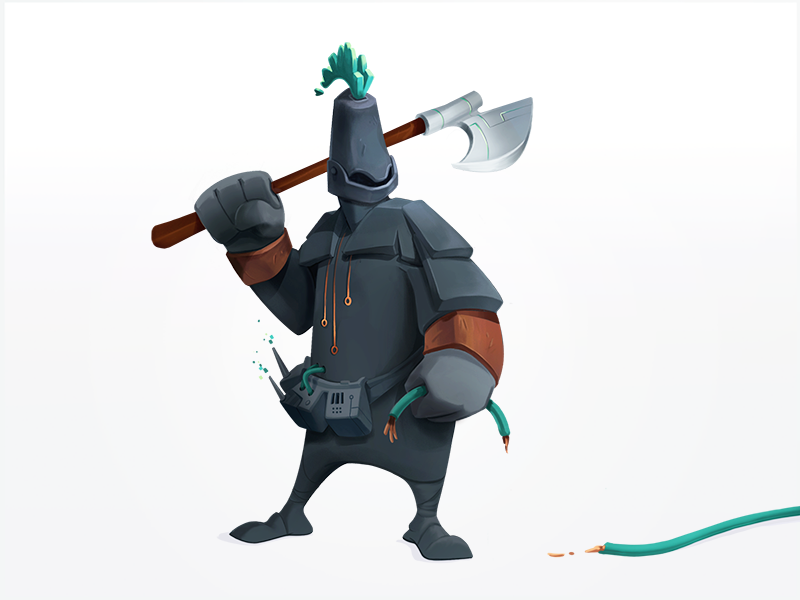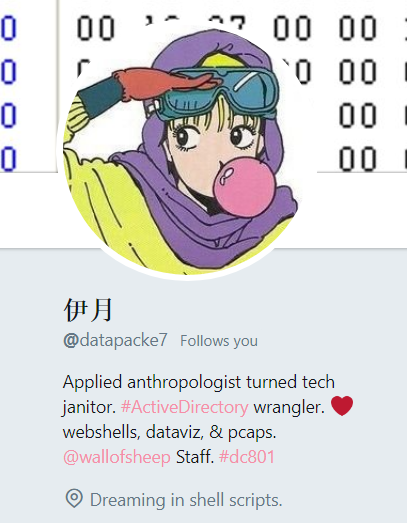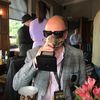Unusual Journeys Into Infosec featuring @Datapacke7
Part Five of the Unusual Journeys Into Infosec series with @CyberSecStu of The Many Hats Club, who talks to @Datapacke7 about her journey.

It’s that time again, we are on a voyage of self discovery, friendship, and perseverance, in one of the most moving stories in the series so far.
“I didn’t choose the hacker life, it chose me — Datapacke7”
If you are new to the Unusual Journeys into in Infosec articles, the vision for the series is to provide stories and inspiration for those who may have not considered, or may be struggling to find a path into Infosec!
This time I interviewed Datapacke7 someone I had not come across on Twitter before, and was introduced to them by Mark C. (LargeCardinal), off the back of my interview with him in January.
However after learning about their story, I was genuinely inspired by their unconventional route, from someone with little to no experience with computers, to Wall of Sheep Staff. This is their unusual journey into Infosec!

CyberSecStu (CSS): My vision for this article (or series), is to help break the illusion that you have to follow a certain route to have a career in Infosec. Where did your journey begin?
Datapacke7 (DP): I was a high school drop out and homeless. I was born in a very impoverished city where that was dubbed Murder Capital for like 8 consecutive years. Where I grew up, there wasn’t much hope. It felt like a city of ghosts. People had dreams as kids, but often they’d take up the bottledly beast or end up in prison.
It was a rough city back East. I knew I didn’t want to be stuck in that city forever because it felt like I was trapped in a box. I was tired of growing up in violence and fear. To help my parents save up money so we could leave this city, I started working at about 8 years old on a blueberry farm. In the summer, my mom would dress me up in thick long sleeves, cover my face with a scarf, and knitted gloves. I’d run around with my baskets and pick as many as I could.
When I was about 11, I moved onto a vegetable packing factory. Back then, it was easy to get away with that kind of work because employers were willing to pay under the table. I was always disguised so they could never tell that I was underage. I remember holding my first machete and slicing vegetables on conveyor belts in the freezing cold as the chlorine in the air burned my eyes. Eventually, I was promoted to machinist because no one really knew how to fix the machines. I just knew how to push and pull til it worked.
The bosses wanted us to be fast and I figured ways to optimize the process without tiring myself out on my feet for 8–12 hrs. Back then I only worked on my holidays and summers. I always prayed for 12 hour days because it meant we would get overtime.
It seems rough to many, but if you have poor illiterate immigrant or refugee parents, money was everything. It kept food on the table and lights on. Simple things that most take for granted, I prayed for. I remember a few times I was stealing food from the employers so we could have a decent meal at home as a kid.
At the time, I justified my thievery because no matter how long we worked, we got paid the same hourly with only 1 meal break. They paid us below minimum wage and were making profits off of us. I figured why the hell would I care, I was just feeding my family and not going hungry.
Over the course of my teenage years, I took odd jobs, mostly ended up working in factories, in extreme hot of cold conditions. In my spare time, I use to grow vegetables and sell them to the local shops for money so I could afford a typewriter. I pretty much typed all of my papers til I was about 23. I owned a vintage Royal Model O my Dad picked up from a yard sale for me.
He would do his best to help me find parts and the ribbons. I can’t lie, but there were moments I wanted to chuck that thing out of a window because I’d go for pages without making a mistake only to make a typo and start all over again. The white-out ribbons made it look sloppy so I was hell-bent on fixing it. Although my family was poor, my dad encouraged me to learn about everything.
My Dad use to be an engineer before his homeland fell into hell with Pol Pot. My family were sent to slave labour camps to work themselves to death. I remember hearing stories about them having to raise roads by packing corpses. You had no facial protection. You couldn’t express discomfort or sadness. Even when your own child dies before you, it’s illegal to cry. They lived the Killing Fields. Identity, knowledge, and curiosity were dangerous to the despotic regime and I think that’s part of why my Dad encouraged me so much to embrace and learn everything from sewing to cooking and fixing pocket watches to kite making.
CSS: That a moving story, so how did you start your journey into Infosec?
But to answer your question, my journey into a career in IT was a serendipitous one.
I was heading to do my PhD then a friend convinced me to attend Black Hat but I couldn’t afford it. So he said Defcon. He bailed on me. He was suppose to be flying from Ontario.
Attending Defcon and joining Wall of Sheep (WoS) changed my life forever, although I didn’t join WoS until a few years later.
But Packet Hacking Village was the first village I attended, I was fascinated by this infamous wall hackers spoke of. I myself came from a very tech illiterate background- as I didn’t own a computer until I was 24 yrs old. I only knew how to surf the web and do research for my courses, and play a few RPG’s thanks to friends!
I’m not sure if this is relevant. I’m a single parent aside for being a full-time academic!
CSS: Very relevant!
DP: Roland Barthes put it best, ‘Each of us has his own rhythm of suffering.’ Humans are heir to inter-generational struggles. I am no exception. Despite struggling for about 3 years with personal setbacks before I got into IT, I nearly gave up. My children kept me going though. You have to remind yourself, you’ve firewalked through hell a few times, you can get through this.
Unlike my prior life as an academic, Tech gave me immediate satisfaction ensuring that what I was doing was safeguarding and educating users’ data. Data is an extension of self. If we do not respect data that we work with what right do we have to access it? Corporations don’t really respect the data they possess. They commodify data while users are slaves to the system. Chomsky’s ‘Manufactured Consent’ comes to mind. However, that’s a conversation for another time.
So it was a weird career change for me but I was fascinated with user experience and data privacy. I use to be intimidated because I didn’t know what Hacking was. But after befriending friends at Defcon - who are in the industry it demystified a lot of my fears.
I just needed to get over my lack of confidence. My parents cannot speak English and I’m a child of refugees. So I spent my life not really being in contact with technology.
CSS: What was your first impression of Infosec when you went to Defcon?
DP: Dumber than a doorknob
CSS: I very much doubt that!!
DP: At the time I felt that way. Computers were foreign to me.
I owe much of my confidence thanks to @wallofsheep @phreakocious@forgottensec @lojikil @Devil_Bunny @LargeCardinal @bitquark
I gained a lot of confidence thanks to them. They never gave up on me. Volunteering I would say made the biggest difference in my life! Much of what I learned wasn’t from talks but getting to know them on an individual basis.
Even when I got depressed and felt like giving up @phreakocious & the crew never let me give up. When I was hitting hard times @LargeCardinal @phreakocious helped pay for my books.
CSS: How did you find your mentors?
DP: It started with a hello.
I was shy but I knew if I didn’t start talking and asking questions I’d never learn. @phreakocious told me “it’s better to look stupid than be stupid”.
People who want you to succeed will never pressure you. If they care they’ll always be around to give you reality checks. I learned to stop making excuses for not being able to understand.
I had to learn how to break things in order to fix it. I was scared of breaking things or making mistakes but that’s the hacker way. I didn’t choose the hacker life, it chose me.
I struggled for about 3 years with personal setbacks before I got into IT.
But I never gave up because I knew this was what I wanted to do with my life. I’d say falling in love with packet hacking made a difference. Linux helped encourage my liberation from closed systems. It forced me to think outside the box and I grew an affinity with networking.
CSS: “I didn’t choose the hacker life, it chose me” is going to be a quote for the article for sure!
DP: I also learned that in Infosec there are a lot of posers. You don’t need to be popular to be good at what you do. You need passion and patience
Plus every hacker was a skid at one point of another. So I’d be a hypocrite to put down people trying to learn. Learning is a skill. Not everyone is born knowing. Hacking is a mindset. You are either curious and willing to push the envelope or you’re not.
That’s what differentiates technical people and hackers. You can be a hacker and be baking cakes or a machinist don’t need to actually be in the tech space - but you learn because it’s what drives your life.
I hope that helps. I have more stories but I think this is the general idea of how I got into IT and embraced hackerdom.
CSS: Actually one of the most interesting, it really struck a chord with me!
DP: I didn’t even know I was a hacker. I loved picking apart pocket watches and mechanical objects and putting it back
CSS: Hacking’s a mindset, with skills and technical ability in that order. Although I’m an Social Engineer, the hacker mindset is focused on reverse engineering human behaviour! What about you?
DP: I possessed soft skills first- I used to not value that- then Riverside and @phreakocious told me I shouldn’t disregard my talents. This “talent” is what helped me survive and persevere.
You need both. I don’t like technical is the correct term but being able to understand or comprehend logic is important. Knowledge is like an onion, you have to keep peeling it til you get to the core and that’s how learning is, it’s a process.
CSS: What was your biggest challenge when trying to break into Infosec?
DP: The biggest challenge is having someone believe in me. People wanted certs I couldn’t afford. It’s hard as person who is financially struggling to make ends meet while trying to pursue a career they may and may not get. It’s risky. I took the risk because of the fact I had hackers and my kids who believed in me.
If I didn’t have the positive support that I did I wouldn’t be here in this field.
CSS: So as a follow up, what advice would you give to someone who’s starting out in Infosec or looking to break into the industry?
DP: Have patience and be passionate the first step is accepting that no one knows everything. You have to find wrong before you can find right. No greatest learning experience is better than failure. Fail fast, iterate. Ask questions and don’t be a dick. People can weed the charlatans from the actually skilled quite easily.
You never know who can be your mentor or colleague so be excellent others. Love and logic goes a long way. It’s never to late to learn what you love.
CSS: Thank you for sharing, you are an inspiration to our industry!
So many lessons can be taken from Datapacke7 journey, but for me there are two key points that stand out.
Firstly, learning is a skill and an attitude! It doesn’t matter if you don’t have the required technical baseline skills, what matters is you have the positive attitude to pushing through those barriers of fear and doubt to learn!
Secondly get actively involved in the Infosec community, go to meet ups, reach out to people on Twitter, because you’ll be surprised how helpful this community is, especially those willing to learn and push themselves!
I think you will agree with me when I say that Datapacke7 is not only an inspiration but a credit to our industry!
Main Image Credit : The awesome piece of artwork used to head this article is called 'Hacker Knight' and it was created by graphic designer Maggie Appleton.


